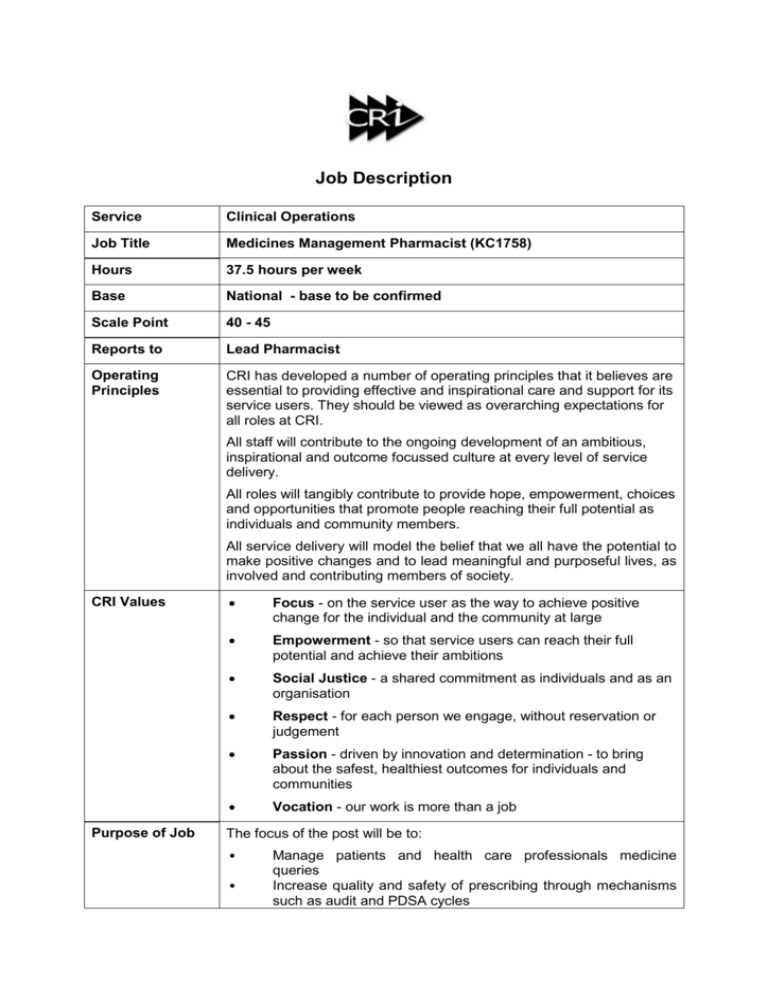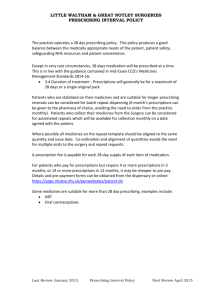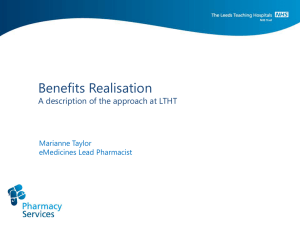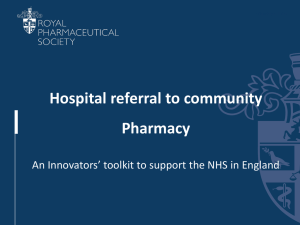Job Specification for Medicines Management Pharmacist
advertisement

Job Description Service Clinical Operations Job Title Medicines Management Pharmacist (KC1758) Hours 37.5 hours per week Base National - base to be confirmed Scale Point 40 - 45 Reports to Lead Pharmacist Operating Principles CRI has developed a number of operating principles that it believes are essential to providing effective and inspirational care and support for its service users. They should be viewed as overarching expectations for all roles at CRI. All staff will contribute to the ongoing development of an ambitious, inspirational and outcome focussed culture at every level of service delivery. All roles will tangibly contribute to provide hope, empowerment, choices and opportunities that promote people reaching their full potential as individuals and community members. All service delivery will model the belief that we all have the potential to make positive changes and to lead meaningful and purposeful lives, as involved and contributing members of society. CRI Values Purpose of Job Focus - on the service user as the way to achieve positive change for the individual and the community at large Empowerment - so that service users can reach their full potential and achieve their ambitions Social Justice - a shared commitment as individuals and as an organisation Respect - for each person we engage, without reservation or judgement Passion - driven by innovation and determination - to bring about the safest, healthiest outcomes for individuals and communities Vocation - our work is more than a job The focus of the post will be to: • • Manage patients and health care professionals medicine queries Increase quality and safety of prescribing through mechanisms such as audit and PDSA cycles • • • • • • • • • • • Key Activities Manage practice formularies to improve the quality, safety and cost effectiveness of prescribing Implement drug withdrawals and alerts e.g. MHRA aimed at improving medicines safety Work with primary care professional and patients to implement NICE and other evidence based guidelines Secure qualitative, safe, robust and appropriate support services in the management of controlled drugs stationary Work with the CRI Medical Director to develop a culture that ensures the safety and effectiveness of the Medicine Management strategy Work with clinical colleagues, the public, service users and partners to establish effective strategies for the on-going improvement of services and ensure systems are in place to effectively communicate this vision to all stakeholders Ensure that CRI has the capacity and capability to exercise its statutory duties both in terms of quality and effective use of public funds Work with Regional Directors when calculating drug costs for tender submissions Work with Service Managers during implementations to secure prescription pads ( FP10) Monitor project prescribing practices Frequently audit prescriptions on Epact data Below is a non-exhaustive list of key activities 1. Medicines Management • • • • • • • To ensure that medicines are used safely and effectively across the organisation, and within the resources available. To ensure that medicines management policies and procedures are developed in accordance with best practice and professional guidelines. Produce quality standards and audit against practices reflected in services with aim to raise standards. Ensure robust systems are in place to ensure communication of essential information relating to the quality and safety of medicines to other clinical staff as necessary. Ensure, in co-operation with the Lead Pharmacist, that Patient Group Directives (PGDs) are developed and delivered in accordance with national standards to ensure safe and effective systems are in place. Support the Lead Pharmacist in analysing incidents, and sharing the learning outcomes through actions both internally in services and externally as part of LINs. Carry out mock CQC inspections along with Safety & Compliance Team to ensure services meet standards. 2. Strategic Planning • • Work with the Lead Pharmacist to effectively deliver the medicines management business plan. Develop strategies to implement national Medicines Management initiatives to improve efficiency, reduce risk and enhance the patient experience. • To develop and implement information services in line with new technology. Work alongside Lead Pharmacist to develop a structured Community pharmacy working relationship that includes education & training, SLA’s, and financial management. • 3. Professional and Legal Advice • • • Provide legal advice internally and externally on all aspects of medicines management. Assist Lead Pharmacist in ensuring appropriate sites hold the relevant Home Office licenses. Ensure policies & procedures are reflective of up to date legislation. 4. Financial Management • • • • • • • Provide analysis of prescribing/dispensing trends and costeffective medicines use, and ensuring the provision of timely and effective prescribing feedback and advice Analyse EPACT data to assist in validating financial invoices. Identify areas in which savings can be made in relation to medicines management. Ensures that information and advice is provided to all health care professions in relation to usage and expenditure on drugs, and promotes clinical economy and cost beneficial drug utilisation. Promotes cost-effective drugs usage within the organisation, within the local Health economy, within partner regions and at national level as appropriate. Is proactive in the efficient and cost effective management of drug budgets within the organisation, contributing locally and nationally to contracting and purchasing initiatives. Plays an active part in controlling drugs expenditure within the organisation. 5. Quality and Clinical Governance • • • • Be responsible for providing medicines information and professional advice on complaints and performance issues, which may require sensitive, professional judgements to be made, involving the analysis, interpretation and consideration of a highly specialised and complex range of situation and/or facts. Ensure the identification and dissemination of regional learning from complaints and performance issues. Support the development and implementation of medicines management audit programmes. Analyse medicines use and recommend, where appropriate, implementation of evidence based, cost effective changes in prescribing practice ensuring compliance with policy e.g. Pharmaceutical Clinical Effectiveness Programme. 6. Personal Practice • Keep up to date with developments in clinical and pharmaceutical practice in order that such developments are recognised and reflected by the Medicines Management staff • • • • and the services provided to patients and the organisation by the department. Participate in appropriate courses and conferences ensuring continuous professional development and adherence to the principles of clinical governance. Support the development of governance systems that are there to protect service users, their families and local communities Support the development of governance systems to increase the workforce effectiveness when working with service users and to improve the quality of care provided Contribute to the implementation of the full range of CRI policies across the sphere of operational responsibility and contribute to new policy and procedure development. General terms of In carrying out the above duties the post holder will: reference: • Participate in appraisal, supervision and Learning & Development processes • Keep abreast of developments in services, legislation and practice relevant to the post • Ensure the implementation of all CRI policies and Procedures • Contribute to maintaining safe systems of work and a safe environment • Work flexibly across the organisation travelling to the Regional sites as necessary • Take responsibility for personal development and participate in regular supervision and appraisal • Seek to improve personal performance, contribution, knowledge and skills. Person Specification Essential Criteria Qualifications Valid registration with GPhC Commitment and evidence of formal continuous professional development (CPD) Experience At least 3 years experience as a registered pharmacist within the UK Able to demonstrate a wider understanding of pharmacy practice and the workings of the NHS, including prescribing and medicines management. Computer literate with Microsoft packages Able to communicate with a wide range of staff from a range of disciplines from both within and outside the NHS Report writing skills Ability to work independently or as a member of a team – builds effective working relationships with team and colleagues Experience of developing clinical protocols and PGDs Knowledge and Understanding Demonstrable understanding of the CRI principles and values as set out in the CRI Vision Up to date clinical knowledge within the substance misuse field Financially literate with the ability to critically review, challenge and effectively utilise financial information for decision making A clear understanding of national system reform policies A strong understanding of the principles of value for money and an ability to challenge performance on this basis A strong understanding of the requirements of effective financial governance and probity Good understanding of the role of effective communications and engagement with patients, public, workforce and stakeholders Attributes and Competencies Demonstrable commitment to continuously improve outcomes, tackling health inequalities and delivering the best value for money for the tax payer Ability to work well with others in teams, networks and organisations Demonstrable understanding of the CRI principles and values as set out in the CRI Vision Capability to understand and analyse complex issues, drawing on a breath of data to inform decision-making, and to see that information ethically to balance competing priorities and make difficult decision. This post is subject to a DBS check at an enhanced level. Amendments: This is a new post and may be subject to change depending on the changing needs within the organisation. Any changes will of course be subject to consultation.




